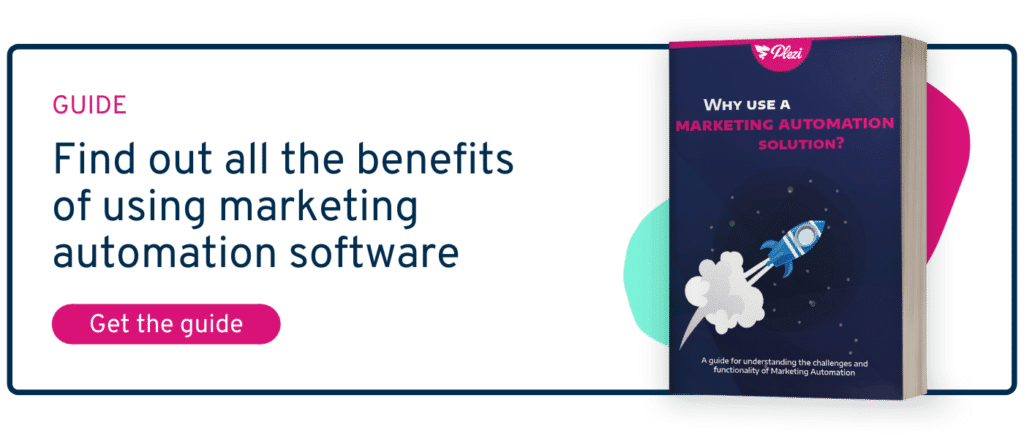Marketing automation tools are a favorite among B2B marketers to generate qualified leads. In this article, we’ll take a look at 20 recent statistics that tell us a lot about marketing automation: importance for marketing teams, usage, and most importantly… ROI! What are the results and how long does it take?
That’s what we’ll see. So if you need to convince your boss to start marketing automation by proving the ROI, go to the second part of the article!
The evolution of the marketing automation market
The market for workflow automation and related technologies is growing at 20% per year and is expected to reach $5 billion by 2024. (Deloitte Insights, 2019)
More and more B2B companies across all industries are equipping themselves with marketing automation solutions to accelerate growth and control costs. Process automation has taken hold in a permanent way within companies, and research proves that this trend will only intensify.
Nearly 66% of marketing automation users agree that their company wants to reduce costs by automating as many tasks as possible in the future. (Deloitte Insight, 2020)
More than 6 in 10 marketers plan to increase their marketing automation budget for the next year.
The latest marketing automation studies show that satisfaction with the use of marketing automation solutions is increasing. B2B marketers are attracted to this type of tool because it saves time, increases customer engagement, provides faster communication and, most importantly, offers better opportunities for both parties. That’s why 63% of marketers intend to invest more money in developing an even more powerful automation strategy.
The use of marketing automation by B2B marketers
91% of marketers believe that marketing automation is essential to their business. (Marketing Automation Report 2021, ZHAW)
This figure is not surprising when you consider that a marketing automation solution allows you to manage your entire marketing strategy from a single tool: centralization of content, forms, landing pages, newsletters, email campaigns, lead nurturing, KPI tracking… Investing in marketing automation is essential to enable marketing to be a real business generator for B2B companies.
86% of marketers consider “ease of use” as the most important criteria when choosing a marketing automation tool. (Findstack)
One of the common mistakes marketers make when choosing a marketing automation tool is to choose a tool with too many features, which is often complex to set up and use on a daily basis. Remember: your marketing automation solution must save you time!
There is nothing more frustrating than getting a tool and then realizing that it requires the support of an agency or an extra person in the marketing team to manage it… A bad choice of tool can quickly lead to additional costs not foreseen at the beginning.
To avoid unpleasant surprises, take the time to do a benchmark of marketing automation tools to choose the right solution for your needs.
54% of B2B marketers use marketing automation to help them with their content marketing efforts and 75% say that marketing automation helps them better understand the performance of their content. (MarketingProfs)
Content creation is one of our top priorities as marketers. But for a content strategy to produce leads (and customers), it is essential to be able to analyze the performance of your content and optimize it continuously.
A marketing automation tool allows us to analyze the results of our content (visits, downloads, conversion rates), and to simply prove the return on investment of our content strategy.
61% of marketers use marketing automation to generate more leads (Funnel Overload)
Marketing automation tools, like Plezi, have the primary objective of generating qualified leads. By equipping themselves with this type of solution, marketers set up landing pages and forms to quickly collect more leads via their website.
90% of marketing professionals regularly use at least one type of marketing automation tool. (Learning Hub)
Marketing automation tools have invaded the daily life of marketers to help us save time and increase efficiency. Today, there are all kinds of marketing automation tools to assist us with everyday tasks: social media automation, email automation, SMS automation, project management automation, data analysis automation… And of course, full-featured marketing automation tools dedicated to qualified lead generation, such as Plezi.
The ROI of marketing automation
80% of marketing automation users see an increase in leads generated and 77% see more conversions. (Invespcro)
Lead generation is often the number one goal of marketers. With marketing automation software, there are multiple ways to generate leads easily. On average, Plezi customers generate 256% more leads in 12 months (Baromètre de l’inbound marketing en France, 2020)
Marketing automation increases marketers’ productivity by about 20%. (Nucleus Research)
Very often, being a marketer rhymes with being overwhelmed. Indeed, it is a profile that must often be Swiss Army knife to carry out various missions: content creation, promotion, email campaigns, social networks, events, reporting … By automating repetitive and time-consuming tasks, marketing automation allows marketing teams to save time on a daily basis and focus only on tasks with high added value: content creation, etc.
Companies using marketing automation software to engage their leads have seen a 451% increase in qualified leads. (Annuitas Group)
A marketing automation tool allows you to take your prospects through their buying cycle in a personalized way by sharing relevant content with them at the right time (with Plezi, you can do this without workflows, simply through the smart campaign). With this lead nurturing strategy, you generate qualified leads for your sales people, who can then focus only on prospects that are likely to become customers, saving time and efficiency.
76% of companies see a return on investment within the first year of implementing their marketing automation software and 44% see this ROI within 6 months (Softwarepath)
With the right tool for your needs and the right support, it is possible to see a return on investment quickly after implementing marketing automation in your company.
Our client Digora, for example, generated 2 customers in just 2 months after implementing Plezi. Want to get started with marketing automation and generate leads and customers quickly? Check out our guide to generating your first results in one month.
On average, marketing automation leads to a 14.5% increase in sales productivity. (Nucleus Research)
Statistics that will convince your boss to start marketing automation
Having trouble proving to your management the value of marketing automation? If the previous part isn’t enough, here are some recent figures that will help you convince him!
63% of companies using marketing automation outperformed their competitors in terms of sales and ROI. (Lenskold Group)
Your business is bound to have competitors (or soon will if your product or service is good!). To gain a sustainable competitive advantage and support your company’s growth, it is in your best interest to adopt an inbound marketing strategy combined with a marketing automation tool.
Companies that use marketing automation are 20% more productive than others (Funnel Overload)
It’s not surprising after what we saw in the beginning of the article: marketing automation saves time for marketing and sales teams, and therefore increases the overall productivity of the company.
On average, 51% of companies already use marketing automation and 58% of B2B companies plan to adopt it. (Findstack)
When we read the figure above, we understand it better! This statistic proves that business leaders have understood the value of marketing automation. It is therefore likely that your competitors have already adopted it or are planning to do so. What if it’s time to take the plunge?
Nearly 75% of companies that have implemented marketing automation solutions have less than 50 employees. (Barometer of B2B inbound marketing in France, 2020)
No, inbound marketing is not just for big companies! In fact, it’s particularly well-suited to small marketing teams that need to save time and increase efficiency. The proof: at Plezi, the majority of our clients are small businesses.
On average, marketing automation reduces marketing overhead by 12.2%. (Findstack)
Implementing a marketing automation tool is the most cost-effective strategy in the long run. When you generate leads, a large portion of them are not ready to buy immediately. Leaving these leads aside would mean throwing the money spent on generating these leads down the drain!
Thanks to lead nurturing, marketing automation will allow us to mature these leads to transform them into customers and thus make the expenses related to lead generation profitable.
Moreover, a marketing automation tool allows us to collect data that will enable us to identify which actions generate the most results, and thus put our budget into profitable actions and optimize our marketing strategy on a continuous basis. This explains the following figure: Companies that implement marketing automation report a cost reduction of 24%, compared to 19% in 2019.
Marketing automation allows us to collect data and thus understand the impact of our marketing actions. What is working? What doesn’t work? Thus, companies using marketing automation solutions are able to put their budget on actions that really bring them a ROI, avoiding many expenses.






